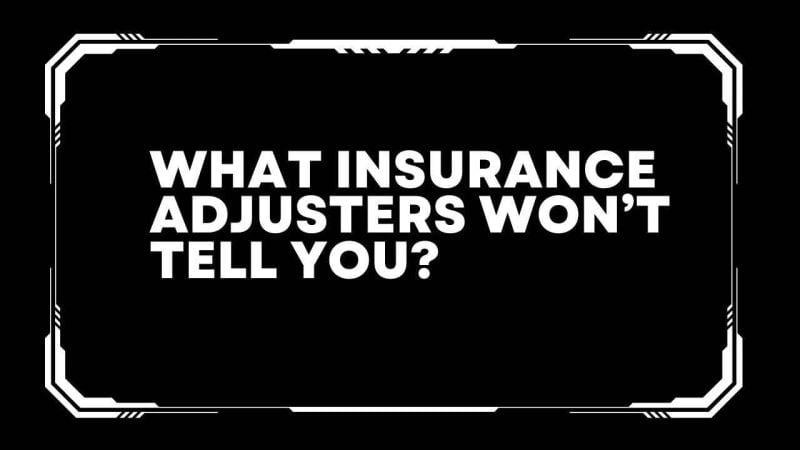Have you ever been in a car wreck? If you have, you know it’s no walk in the park. Suddenly, you’re dealing with injuries; maybe you can’t work, and the bills are piling up. Then there’s the insurance claim process. It’s like trying to solve a puzzle without all the pieces. And guess what? The other driver’s insurance company? They’re not your buddies in this. They’ve got their game plan: to pay out as little as possible. It can leave you with questions and uncertainty about your next move. Here are some possible terms What won’t insurance adjusters tell you?
What insurance adjusters won’t tell you?
The Other Driver’s Policy Limit
When you start talking to insurance folks, one thing they tend to keep under wraps is the other driver’s policy limit. That’s the maximum amount their insurance will cough up in an accident. Why keep it hush-hush? It’s simple: knowing the number makes it easier for you to aim high in negotiations. It’s like trying to hit a target in the dark.
But here’s a little secret: lawyers know how to get this information out in the open. They can cut through the fog and shine a light on that mysterious number, so you know exactly what you’re working with. Think of them as your detective—someone who knows how to ask the right questions and isn’t afraid to ruffle a few feathers to get you what you need.
Undisclosed insurance policies
Sometimes, there’s more than one pot of gold at the end of the insurance rainbow. What does that mean? Well, the person who bumped into your car might have multiple insurance policies. This is especially true if you get tangled up with a big trucking company—they usually have layers of insurance. But here’s the kicker: the insurance company won’t spill the beans alone. When sharing that information, they’re tighter than a jar with a stuck lid.
That’s where a sharp lawyer comes into play. They’re like a master key for unlocking information. They can dig around and find out if extra coverage lurks somewhere. And they do this by playing hardball, taking the case to court if that’s what it takes. Because for them, it’s not just about what’s on the table—it’s about what’s hiding in the cupboards, too.
Your Right to Choose an Auto Repair Shop
After an accident, your car looks rough around the edges. So, you need a good mechanic. The insurance company will probably hand you a list of their “favorite” repair shops. But guess what? Just because they give you a menu doesn’t mean you can’t order from it. You’re free to take your ride to any shop you trust to do a good job.
Think of it like this: You wouldn’t let someone else pick out your clothes, so why let the insurance company pick out who fixes your car? Sure, they like to nudge you towards their preferred shops, but it’s your car, your choice. Please don’t be shy about it, either. Your lawyer can back you up on this and ensure the insurance company respects your decision. It’s all about providing your car returns to tip-top shape in a place you trust, with no funny business.
Not to answer insurance adjusters’ questions.
Insurance adjusters have gotten many questions about the accident and your injuries. Here’s the thing—they’re recording every word you say. They’re hoping you’ll let something slip that they can use to pinch pennies on your claim. But hold your horses—you don’t have to spill the beans right then and there. You can say, “Let me chat with my lawyer first,” that’s perfectly fine.
Think of it like a game of chess. You want to make a move by thinking it through, right? The same goes here. Get some legal advice before you start sharing. It’s like having a chess master whisper moves in your ear so you don’t end up in checkmate.
The Significance of Not Signing Forms Prematurely
After an accident, you’ll get hit with a storm of forms from the insurance company. They might even ask you to sign one that lets them examine your medical history. Now, that’s a big ask. And just like you wouldn’t give out your house keys to just anyone, you shouldn’t sign these papers without talking to a lawyer.
Signing off on the dotted line might seem harmless, but it can tie your hands later. It’s like signing a contract without reading the fine print. A lawyer will read those lines with a magnifying glass, ensuring nothing sneaky in the details.
Claims Involving Friends or Relatives as Drivers
Okay, what if a friend or your second cousin, twice removed, was driving when the crash happened? You might think, “Ah, I can’t go after them—that’s family.” But here’s the deal: Their insurance is there for a reason. Filing a claim doesn’t mean you’re throwing them under the bus.
Auto insurance is like a safety net for these exact situations. And no, you’re not causing them any trouble. The insurance pays out, not your pal’s piggy bank. Pursuing a claim is about helping you cover the costs of the accident, not about causing drama at the next family reunion. A lawyer can help keep things civil and ensure everyone understands it’s business, not personal.
To get Early Legal Representation
Refrain from falling for the adage that you should only call a lawyer when things get messy. Nope, that’s like putting on a life jacket after falling overboard. You can contact a lawyer when the dust settles from the crash. It’s wise to have someone who speaks fluent “insurance” from your side right from the start.
A lawyer can guide you through the tricky bits before you even deal with the insurance company. They’re like a trusty guide in the legal jungle, hacking away at the red tape and leading you to the clearing. And the insurance adjusters? They take notice when you’ve got a legal eagle on your team. It tells them you mean business and you know your stuff.
Right to Assess and Reject Settlement Offers
So, the insurance company slides an offer across the table. It might look shiny on the surface, but wait to bite. You wouldn’t buy a car without kicking the tires. Same thing here. That first offer is often a lowball, hoping you’ll grab it and run. But hold up, partner. You’ve got the right to say, “No deal,” and wait for something better.
Chat with your lawyer before saying “yes” or scribbling your name on anything. They have a nose for sniffing out an offer that’s too skinny. They’ll ensure you get the whole meal deal, not just the appetizer.
The settlement offer will not cover everything.
When that settlement offer comes in, it might sound like it’s covering all the bases. But is it? It might cover the trip to the emergency room, but what about the check-ups down the road? Or the work you missed? More chapters in your recovery story could need to be written into that settlement.
A lawyer’s job is to ensure the offer isn’t just a band-aid when you need surgery. They look at the big picture from now until way later. They provide the offer isn’t just a quick fix but something that’ll stand the test of time, covering all the “what-ifs” of your recovery road.
The role of personal injury lawsuits is useful.
Now, most car shindigs get sorted out without stepping foot in a courtroom—insurance companies like to settle before a judge gets involved. But don’t you go thinking that a lawsuit is off the table? Sometimes, the threat of bringing in the judge and jury gets you a better handshake.
A lawsuit is like a big, bright flare shot into the sky—it gets attention. It tells the insurance company you’re serious and not just going to settle for pocket change. Your lawyer can be holding that flare gun, ready to fire if the deal on the table doesn’t stack up.
Can I Get Compensation Despite a Partial Fault?
Let’s say you had a hand in the accident—maybe just a smidge or more. In some places, like New Mexico, you can still get a slice of the compensation pie—even if you were partly to blame. It’s called pure comparative fault. Imagine it’s a tug-of-war, and your piece of the settlement gets lighter the more you tug on the wrong side.
In Texas, it’s a bit different. It’s more like a balancing act called modified comparative fault. If you’re less than 51% at fault, you can still win a prize, but you might be walking away empty-handed if you’re more than half to blame.
Conclusion: What insurance adjusters won’t tell you?
So, there you have it—your roadmap through the insurance maze after an accident. It’s all about knowing what’s behind the curtain and having the right guide to show you the ropes. Whether sniffing out hidden policies, choosing the best repair shop, or understanding when to play the lawsuit card, having a seasoned car accident attorney can turn the tables in your favor.
Insurance companies are playing their game, but you don’t have to play by their rules. You can have your game plan with a legal pro who knows all the moves. So before you take a step, make a call, or sign on the dotted line, get a lawyer to shine a light on those secrets the insurance adjuster won’t tell you. It’s your story; ensure you’re writing the ending.




